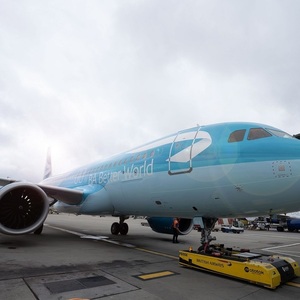Nova Pangaea announces grant from UK to support SAF project

SOURCE: Nova Pangaea Technologies
October 26, 2021
BY Nova Pangaea Technologies
The U.K. Department for Transport has awarded Project Speedbird, a partnership between Nova Pangaea Technologies, British Airways, and LanzaJet, £484,000 to fund a feasibility for the development of sustainable aviation fuel (SAF) in the U.K. The funding was awarded as part of the U.K. Department of Transport’s Green Fuels, Green Skies competition to develop sustainable aviation fuel, announced earlier this year.
As a result, the Project Speedbird collaboration will begin early-stage development of the U.K.’s first integrated SAF production facility utilizing wood waste and support U.K. SAF sector growth by deploying innovative production technologies at a commercial scale. It will also help the U.K. meet its goal of reducing aviation sector emissions.
Starting in 2025, Project Speedbird will begin to recycle carbon from U.K. wood waste into 113 million litres of SAF and renewable diesel (RD) per year, to meet the current SAF supply-demand gap in the U.K. The fuel produced is projected to power 2,000 British Airways’ flights from London to New York operated on the airline’s A350 aircraft.
Advertisement
The ground-breaking Project Speedbird SAF Production Facility will utilise an integrated technology platform based on Nova Pangaea’s REFNOVA process. REFNOVA converts woody and agricultural residues (lignocellulosic feedstocks) into sustainable biocarbons, biochemicals, biopolymers, and drop-in for advanced biofuels. LanzaJet’s ATJ technology will then convert the ethanol into Synthetic Paraffinic Kerosene (SPK), SAF, and Synthetic Paraffinic Diesel (SPD), or RD.
Sarah Ellerby, CEO at Nova Pangaea Technologies said, “We are very excited to have been granted GFGS funding to develop sustainable aviation fuel and proud to partner with British Airways and LanzaJet, in support of the Prime Minister’s Ten Point Plan for a Green Industrial Revolution which was announced last year. We want the U.K. to be a world leader in SAF and to do this we have to be ambitious and embrace innovation. There is no doubt that this will help to move us towards decarbonising the aviation sector. We plan to deliver the first end-to-end, sustainable value chain from U.K. wood waste and residues to SAF in the U.K.”
Advertisement
Sean Doyle, British Airways chairman and CEO, said, “We’re committed to a sustainable future and to achieving net zero carbon emissions by 2050 and have built a clear roadmap to get us there. In the short-term this means improving our operational efficiency and using carbon offset and removal projects while in the medium to longer term we’re investing in the development of sustainable aviation fuel and looking at how we can help with the growth of zero emissions hydrogen-powered aircraft and carbon capture technology.  
“We’re delighted to receive this crucial support from the Government’s Green Fuels, Green Skies competition, which is critical in driving forward the development of sustainable aviation fuel in the U.K. Our parent company, IAG, was the first European airline group to commit to powering 10 per cent of our flights with sustainable aviation fuel (SAF) by 2030 – purchasing one million tonnes of SAF each year, equivalent to taking a million cars off Europe’s roads every year.” 
Jimmy Samartzis, LanzaJet CEO, said, "This is an important milestone for the aviation industry in its transition towards cleaner skies. The partnership between Nova Pangea Technologies and British Airways, along with the grant made through GFGS, is critical to advancing the Prime Minister's Ten Point Plan for a Green Industrial Revolution and advancing the technology that exists today to reduce aviation sector emissions. Using LanzaJet's ATJ technology to transform wood waste from the U.K. into 100 million litres of SAF per year, starting in 2025, will help the U.K. meet its goals and position the U.K. as a global leader in embracing new technologies to meet some of our world’s greatest challenges. We look forward to deploying this technology and meeting the industry's demand for SAF for years to come."
Related Stories
The U.S. EPA on July 29 released a proposed rule to repeal the agency’s 2009 Endangerment Finding, which forms the legal basis for the agency’s GHG regulations. The proposal also aims to repeal all GHG regulations for motor vehicles and engines.
Chevron Lummus Global announced a successful commercial test for coprocessing biogenic feedstocks and fossil feedstocks at INA Group's Rijeka Refinery in Croatia. SAF and renewable diesel were produced during the test.
Phillips 66 on July 25 released Q2 financial results, reporting the company’s Rodeo Renewable Energy Complex in California continues to run at reduced rates due to market conditions. Pre-tax income for the renewables segment was up when compared to Q1.
The EIB and Eni on July 24 signed a €500 million 15-year finance contract to support the conversion of Eni’s Livorno refinery in Tuscany, Italy, into a biorefinery that can produce renewable diesel, renewable naphtha and bio-LPG.
Iowa Secretary of Agriculture Mike Naig announced that the Iowa Renewable Fuels Infrastructure Program Board recently approved an additional 24 applications from Iowa fuel retailers to support new and expanded biofuel infrastructure projects.
Upcoming Events










